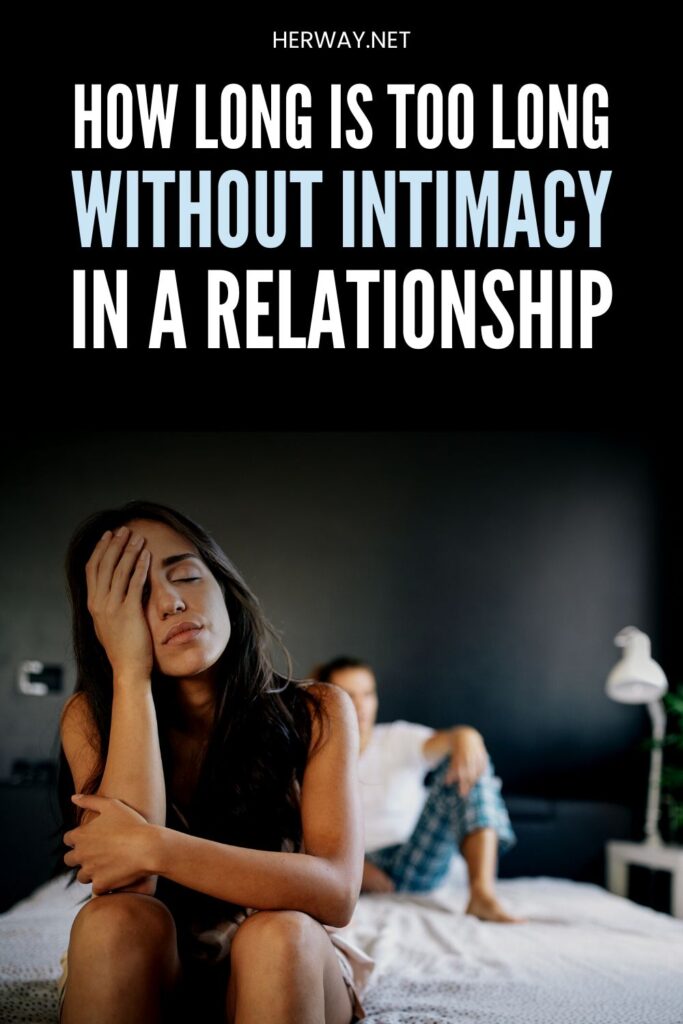How Long Is Too Long Without Sex In A Relationship
Before you can figure out how long is too long without sex in a relationship, think about why you’re asking this question. The answer largely depends on your reason.
Do you or your partner a) believe that a certain weekly/monthly/yearly quota you must fulfill to have a satisfactory sex life exists, or b) feel unhappy with the amount of sex you’re having?
If you chose option a, the answer is simple: there are no rules when it comes to the amount of sex you should be having with your partner. It depends entirely on the partners and trying to reach some arbitrary number of times would just make you frustrated.
Option b needs a much more complex answer, so keep reading to find out if your level of intimacy with your partner is low and what to do about it.
How Long Is Too Long Without Sex In A Relationship?

The only way to know how long is too long without sex in a relationship is to figure out what not enough sex means for you and how your partner feels about it.
If you or your partner feel unhappy with anything related to sexual activity in your relationship, it’s important to talk to each other about it openly. This is the kind of problem that doesn’t go away on its own and needs to be discussed.
• If you’re on the same page
If both you and your partner are happy with the frequency of your sexual encounters, you don’t have to worry if you’re not meeting a certain number of times or if you’re exceeding it.
For example, if both you and your partner feel that having sex once a month is not enough, then that’s your answer. If you’re both happy with not having sex at all, you can still enjoy a happy and healthy relationship with each other without experiencing sexual frustration.
Having or not having sex just because you believe you should won’t make you happy. Instead, work on communication and closeness with your partner to keep enjoying a satisfying emotional and sexual relationship.
• When one person is unhappy with how often you have sex
You need to explore the root of your problem to find the reason for your different sexual activity needs. When there’s a lack of physical intimacy in a relationship, compromise doesn’t work in the same way as it does with other relationship issues.
If you want to create a relationship you’re both happy with, the needs of both partners matter. You need to collaborate with your partner to find a solution that works for both of you. Anything else can easily end in resentment and more problems.
Pressuring someone for sex or shaming them for wanting it too often doesn’t help. You need to approach this issue with empathy, compassion and willingness to understand, and look for the other needs that are not being met in the relationship.
Exploring all the ways to deepen your connection and develop intimacy, sexual and non-sexual, is much more important for relationship satisfaction than the frequency of sex.
See also: How Long Should You Talk To Someone Before Dating? (A Guide)
Why Do Couples Start Having Less Sex?

Many variables can affect sexual intimacy. If you’re currently unhappy with the lack of sex in your relationship, it’s important to explore the reasons and try to understand them because that’s what matters far more than how often it happens.
Try to consider if some of the following areas might include the underlying causes of decreased sexual intimacy, applying them to both yourself and your partner.
1. Health issues
The first thing you need to consider is your physical health, especially if there have been any changes to it. Many health problems can influence sexual desire in a negative way. It’s best to visit your doctor and openly talk to them about your situation.
Hormones play a great role in sexual desire levels, while problems such as pain and discomfort can make you feel disinterested.
If you’re taking any medication, check if they have sexual side effects. Many drugs can cause problems such as low sex drive, erectile dysfunction or difficulty reaching orgasm. Your doctor can adjust the dosage of the medicine or give you a replacement if it’s causing you issues.
2. Emotional and mental health problems
Anxiety and depression can kill your libido. If you’re suffering from any emotional or psychological issues, this might easily be the reason behind your problems with sexual intimacy. When you’re struggling, sex is usually the last thing on your mind.
Additionally, insecurities can impact your sexual interactions, such as worrying about your performance or feeling unhappy with your body, which often happens if it has recently changed.
Stress is another area to explore. While everyone is aware that stress can be damaging, most people don’t take it very seriously, even though it happens at home, at work, or in relationships.
When it becomes too much, stress can affect you on a physical and emotional level to the point that you stop enjoying sex with your partner. The brain is your largest sex organ, so if you’re unhappy with your sex life, it’s one of the likely culprits behind the reasons.
3. Life events
Depending on what your relationship with your partner is like and what’s going on in your lives at the moment, it might just be circumstances.
You might be experiencing a temporary dry spell caused by something that’s going on in your life and not be on a slippery slope leading to a sexless marriage you never wanted.
If you’re more busy and tired than usual, if you’ve been through a stressful change, if you changed your job, moved homes, if you have family issues or if you’ve had a baby – any situation that needs your full attention can cause lowered sexual desire.
It’s important not to become used to the lack of intimacy during these circumstances. This includes sexual intimacy, but also other types of intimacy with your partner that might also be suffering from the current situation.
4. Communication problems
There’s nothing like a lack of communication to cause issues in relationships. From misunderstandings to resentment, not communicating effectively and openly can create a problem where it could have easily been avoided.
General communication problems will often cause a lack of interest in sex. When one partner feels that the other person isn’t listening or doesn’t understand or if you argue, criticize or ignore each other, the desire to be intimate with each other goes away.
Not talking about your sex life is another likely cause. It’s important to talk openly about sex, your needs and your feelings. Expecting the other person to read your mind and anticipate what you want doesn’t work.
5. Relationship problems

What everyone fears when facing problems with physical intimacy in a relationship is that their partner’s feelings for them have changed or that they’re not sexually interested in them anymore.
This doesn’t have to be the case, but if it is, sex won’t solve it, regardless if you have it every day or not at all. A lack of sex can be a symptom of a larger problem, but it’s almost never the only one.
You must talk to your partner and find solutions that work if you want to continue your relationship and avoid a breakup.
If you’re having other problems besides less frequent sexual activity, this is what you need to focus on. No matter how much sex you have with each other, it won’t help unless you deal with the underlying issues.
How you feel about your partner and how connected you are is another important variable. Unless you feel safe and comfortable with your partner, your sex life won’t be satisfactory.
6. Adjusting to a long-term relationship
When you enter into a new relationship, you still don’t know the person well. You’re infatuated with the idealized image you created and hormones are running wild.
Initial desire born out of novelty, heightened physical responses and fantasy result in an increased sex drive. At first, having sex with your new partner is all you can think about, but as you get to know each other better, this changes.
Your feelings for each other change into something deeper and more stable and your desire changes as well. Most people in long-term relationships have less sex with each other than when they just got together.
Cohabiting and dealing with everyday life can make sex the last item on your list of priorities. You might start to feel as if your partner loves but doesn’t desire you. If you’re unhappy with your sex life and you believe this is the reason, there’s plenty you can do.
Focus on deepening the intimacy with your partner by talking to them with empathy and without judgment. Tell them how you feel and listen to what they have to say.
Expressing your needs is the best way to get them met. If you and your partner are both willing to work on your relationship, this problem can be solved.
How To Help Your Relationship

How to cope when the intimacy stops?
Sex is healthy. It improves your overall well-being, increases cardiovascular health and reduces stress. On the other hand, all of these health benefits are absent when your sex life is causing you anxiety.
Intimacy is key
If you can pinpoint the reason why you and your partner aren’t having sex, it becomes much easier to work on this issue. When there are other issues affecting your sexual activity, first work on solving them.
Keep in mind, however, that a romantic relationship can be healthy and happy even without sex, if both partners are okay with it. A sexless relationship doesn’t mean a relationship without intimacy.
This is what it all boils down to: intimacy. Intimacy is the closeness between people in a relationship.
When you’re intimate with someone, you can be vulnerable and open with them. It means that you can talk to your partner and work on underlying issues, theirs and your own attitudes toward sex, your thoughts, feelings and beliefs.
It means that there’s a willingness on both sides to work on the problems in your relationship and ensure that both of you are happy in it.
According to an article in Archives of Sexual Behavior volume 46, the official publication of the International Academy of Sex Research,
“When it comes to feelings of marital satisfaction, therefore, a satisfying sex life and a warm interpersonal climate appear to matter more than does a greater frequency of sexual intercourse.”
Cultivating sexual and non-sexual intimacy that works for the both of you is key to a healthy relationship. There are many intimate things to do instead of sex, but when it’s as important to help each other meet your sexual needs as well.
Awakening and maintaining desire

Research published in an article in Social Psychological and Personality Science journal, volume 4, issue 3 provides the results of research on communal strength in the sexual aspect of a relationship. It states that “being motivated to meet a partner’s sexual needs sustains sexual desire in long-term romantic relationships.”
What does this mean and what is communal strength?
Communal strength
Motivation to meet your partner’s needs is called “communal strength.” This implies giving your partner what they need without expecting them to reciprocate in the same amount.
It’s important to note that this is different from prioritizing your partner’s needs without considering your own, but about the balance between responding to their needs and asserting your own.
It has previously been proven that people who are higher in communal strength feel good about giving to their partners and have happier relationships as a result. In other words, doing things for your partner without keeping a tally makes for a happy relationship.
Although communal giving isn’t about being giving because you expect something in return, communal motivation also implies that it’s mutual. People who are motivated to meet their partner’s needs reasonably expect their partners to be motivated to meet their needs as well.
When one partner is communal and the other takes advantage of it, the giving partner should stop being giving or reconsider the relationship. Truly happy relationships are those in which both partners are giving without keeping score.
Sexual communal strength
The research mentioned has found that people high in sexual communal strength enjoy their sexual experiences more, feel more relationship satisfaction and maintain sexual desire over time in long-term relationships.
When both partners are mutually responsive and communally motivated, they both benefit. They go out of their way to meet their partner’s needs without forgetting their own in the process.
Having a partner who meets your needs makes you feel happier in the relationship and more committed to them. Of course, this only applies when it’s mutual.
Let’s say your partner loves a restaurant you don’t particularly like, but don’t really hate. Going to that restaurant isn’t ideal for you, but your partner loves it so much that their happiness makes up for the negative feelings you have about the restaurant.
Your partner, on the other hand, likes sleeping with an open window, but because you tend to get cold, they close it before bed anyway because your comfort is more important to them than a slight preference they have.
How does this apply to your sex life?
It means: have sex anyway.
An example of sexual communal strength would be having sex when your partner suggests even if you’re not feeling desire at the moment. It’s not about doing something you don’t actually want to do but feel pressured to.
It’s about doing things that will make your partner happy but not at your own expense. Your needs matter as much and communal strength is about figuring out how to meet your partner’s needs without ignoring your own.
When you engage in sexual activity with your partner even if you aren’t already aroused, foreplay, exploring each other and enjoying time together get you there most of the time.
If they don’t and you decide that you want to stop, that’s also a part of it. At that point, your partner should choose to meet your needs because, at the moment, they matter more.
Having sex even if you’re not feeling burning passion at the moment has all the benefits of sex and both of you enjoy it. This is why the result of sexual communal strength is increased and sustained desire – it teaches you to awaken it instead of waiting for it to come on its own.
Communicating your feelings and needs with empathy and understanding will help you get to the point where you can find communal strength in both of you.
3 Steps To Revive Your Sex Life

If you’ve read the article this far, what follows is already clear to you, but here it is anyway.
To achieve sexual satisfaction, what matters is honest and effective communication, intimacy and making sure that sex actually happens.
1. Communicate
Are you uncomfortable talking about sex, or are you awkward when you try broaching the topic with your partner? Even if you are, you should still gather your courage and do it anyway.
Share your needs and desires and listen to your partner when they talk about theirs. Open up to each other and show curiosity without judgment. When problems arise, don’t wait to bring them up. Learn about each other.
If talking about sex is especially difficult, getting the help of a sexologist or a sex therapist can be very useful to get you started.
2. Make sex a priority
When life gets hectic, sex is, unfortunately, often forgotten. After a busy day, all you want to do is sleep and time for sexual activity never comes. If you want to have more sex, make the time.
One solution is to have a set time at the frequency that works for both partners. Planning sex might not seem that romantic, but it’s much more romantic than feeling sexually dissatisfied.
For example, you can decide to have sex once a week and then clear your schedule to accommodate it. It’s a reminder not to neglect this aspect of your relationship.
It’s something to look forward to between sessions, but also doesn’t have to be the only time you have sex.
3. Explore intimacy
This doesn’t have to mean learning how to spice up your sex life by using sex toys or new positions, although it might.
For a happy sex life and a healthy relationship, you should nurture all kinds of intimacy.
When sex frequency goes down, non-sexual physical intimacy often decreases too. Cuddle, kiss and hold hands in addition to having sex.
Don’t neglect emotional intimacy either. Share your feelings, support each other and don’t be afraid to be vulnerable.
To Sum Up
How long is too long without sex in a relationship? When it comes to your own relationship, only you know the answer and hopefully this article has helped you find it.
As long as you and your partner are in agreement, whatever it is that the both of you are happy with is the ideal sexual frequency.
If there’s a difference in the levels of desire for sexual activity, you can examine the possible reasons until you find what non-sexual needs aren’t being met in your relationship.
Creating a relationship in which both partners focus on meeting the other person’s emotional, physical and sexual needs without compromising their own is key to sustained desire and happiness.
The most important thing in all the scenarios is communication and compassion. This issue can make or break your relationship, so take great care to work together with your partner.








